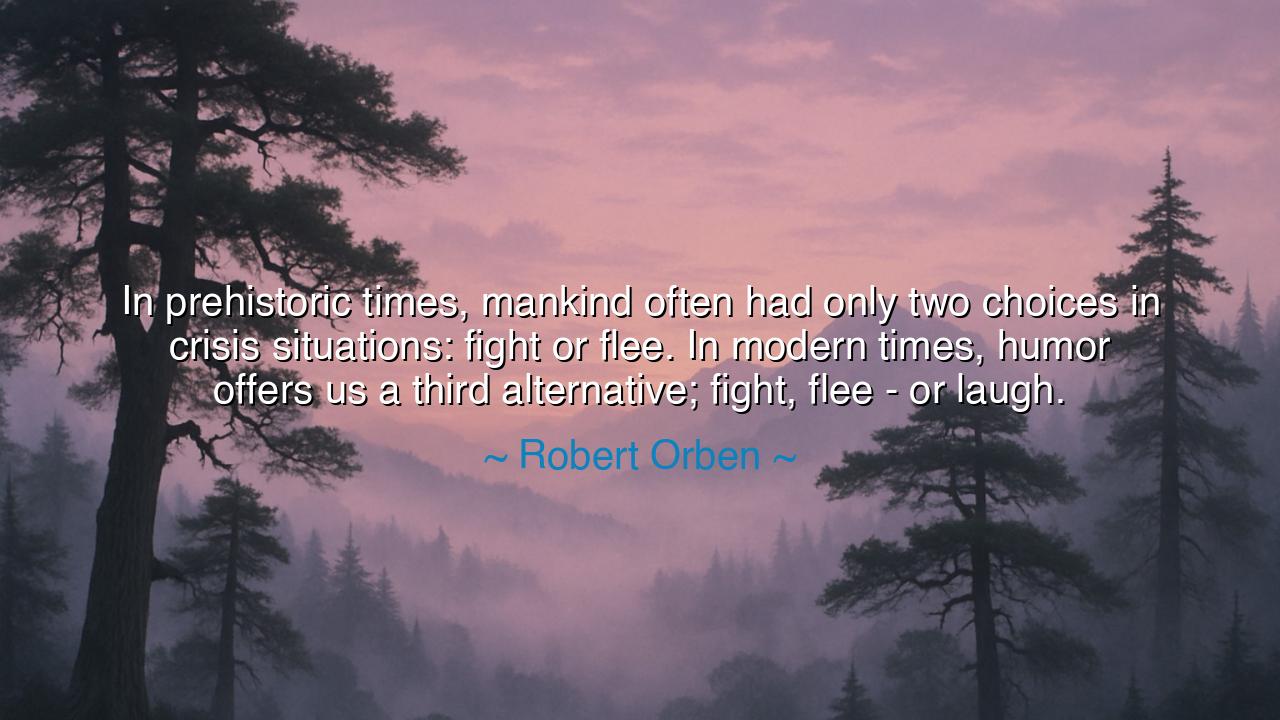
In prehistoric times, mankind often had only two choices in
In prehistoric times, mankind often had only two choices in crisis situations: fight or flee. In modern times, humor offers us a third alternative; fight, flee - or laugh.






The words “In prehistoric times, mankind often had only two choices in crisis situations: fight or flee. In modern times, humor offers us a third alternative; fight, flee — or laugh” by Robert Orben shine with both wit and wisdom. They remind us that while the weapons and tools of humanity have evolved, the essence of our struggle remains unchanged: how to confront fear, adversity, and the unknown. Yet Orben reveals something profound — that through the gift of humor, humankind discovered a third way of surviving chaos: not by the sword, not by escape, but by the transforming power of laughter.
In the earliest days of humanity, our ancestors faced life as a storm of dangers — the roar of beasts, the chill of hunger, the endless struggle for shelter. Their instincts gave them only two paths: fight or flee. These were the laws of nature, written in the blood and bone of survival. But as consciousness awakened — as language, art, and spirit were born — man began to seek something beyond instinct. In time, he learned that though the world’s terrors remained, his mind could shape them differently. Humor became the spark of that new consciousness — a way not only to endure fear but to transcend it.
To laugh in the face of danger is no small act; it is rebellion. It is to declare that the world may wound the body, but never the soul. Orben’s insight shows that laughter is not weakness, but a subtle form of strength — the courage to maintain lightness when gravity would crush the spirit. Ancient peoples understood this long before the modern age. The jesters of old courts, cloaked in foolishness, often carried more wisdom than kings. The Greek playwright Aristophanes, in his comedies, mocked the follies of war and politics — not to belittle them, but to remind Athens that truth and laughter often walk hand in hand. In humor, man found not only a defense against despair, but a weapon of insight.
Consider, too, the story of Winston Churchill during the dark days of World War II. Surrounded by ruin and uncertainty, he once said, “When you’re going through hell, keep going.” Yet beneath his stern resolve was a humor that sustained both himself and his people. He joked, he teased, he laughed — not because he ignored suffering, but because he understood that laughter is the fire that keeps courage alive in the coldest night. His humor was not frivolous; it was defiance — the same defiance that Orben calls the “third alternative.” Where others might have fought blindly or fled in fear, Churchill and his nation endured by finding strength in shared laughter.
Humor, in its truest form, is an act of spiritual alchemy. It takes pain and transforms it into perspective; it turns sorrow into understanding. To fight is to face the world with muscle, to flee is to surrender, but to laugh — to truly laugh — is to rise above both. The philosopher Nietzsche once said, “Perhaps I know best why man alone laughs: he alone suffers so deeply that he had to invent laughter.” Orben’s quote echoes this same eternal truth — that humor is humanity’s most noble invention, the bridge between suffering and survival.
And yet, laughter must be wielded wisely. The ancients cautioned that humor without empathy becomes cruelty, just as courage without wisdom becomes recklessness. The laughter Orben speaks of is not mockery, but resilience — the kind that unites, heals, and clarifies. It is the laughter of those who look into the chaos of life and whisper, “You will not break me.” It is the laughter of the soldier writing home, the mother comforting her child, the weary soul who still finds light in the world’s absurdity.
So, dear listener, take this lesson to heart: learn to laugh, not as escape, but as strength. When life corners you with the demand to fight or flee, remember the third path — to laugh with courage and compassion. For laughter is not denial; it is wisdom smiling. It is the soul’s refusal to surrender to darkness. Let humor be your shield and your song, your quiet act of heroism amid the noise of fear. For as Robert Orben reminds us, to laugh in the face of crisis is not to ignore reality — it is to master it.






AAdministratorAdministrator
Welcome, honored guests. Please leave a comment, we will respond soon